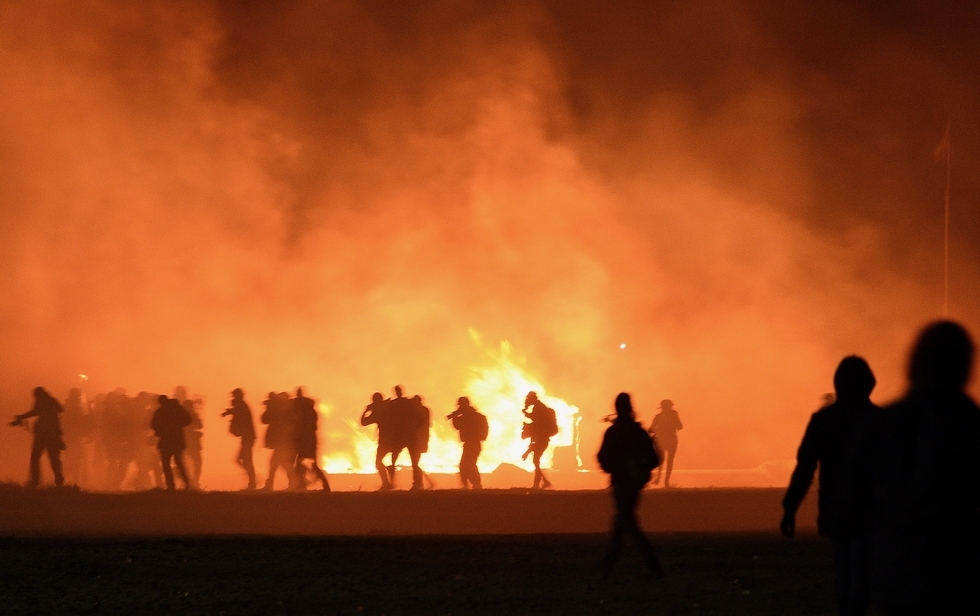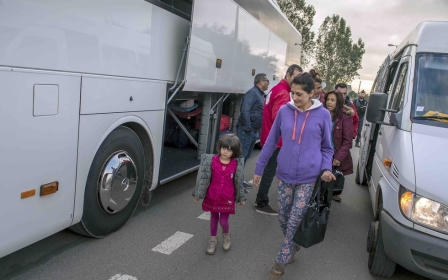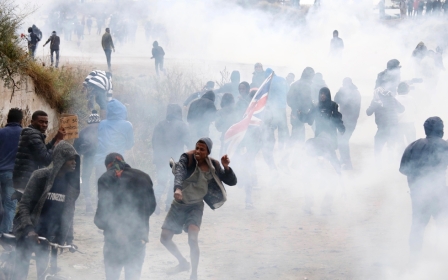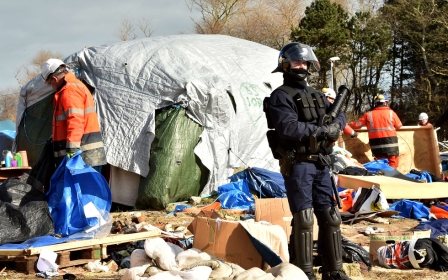Calais 'Jungle' migrants are urged to 'give up British dream'

On the eve of the demolition of the Calais "Jungle" camp, French officials on Sunday handed out flyers informing migrants of the camp's imminent closure and urging them to abandon their dreams of reaching Britain.
But less than 24 hours before the operation to raze the squalid settlement near Calais port was due to start, some migrants and refugees were still clinging to hopes of a new life across the Channel.
The demolition of the Jungle aims to close a difficult chapter in Europe's migrant crisis. The camp has strained relations between France and Britain and caused tensions with locals in Calais.
Each night, migrants try to get past police to try to climb aboard trucks heading to the port - a perilous venture responsible for most of the 33 migrant deaths in the Calais region since 2015.
Clashes between migrants and police erupted Saturday night at the camp, Sue Jex, head of operations for the charity Care 4 Calais, told CNN. She said a number of buildings inside the camp were destroyed by fire.
By Sunday night, CNN counted at least seven vans loaded with riot police, armed with tear gas, arriving on the scene.
On the outskirts of the camp, migrants gathered around small fires on the gravel path and in a dumpster. One person taunted a group of police officers near one of the small fires and attempted to film them on his mobile phone. Police charged toward him until he backed off and moved away. At least six small fires were spotted within the camp and its outskirts, CNN reported.
"We have yet to convince some people to accept accommodation and give up their dream of Britain. That's the hardest part," Didier Leschi, head of the French immigration office OFII, told AFP.
Some migrants have vowed not to budge - or to make their own way back to Calais from the regional shelter to which they are sent.
"They'll have to force us to leave. We want to go to Britain," Karhazi, an Afghan, said.
A Syrian refugee named Sam told AFP that "dozens" had left the Jungle early to avoid being sent elsewhere in France.
"I have been in the Jungle for 13 months and during this time I have learnt not to trust the authorities. They always say one thing and then do another. So last night I left the Jungle and pitched my tent in another place," about a dozen kilometres away, he said.
Others welcomed the move.
"The officials say tomorrow is the beginning of something better. Let's hope this is true," Faisal al-Ajab, a 39-year-old Sudanese man, said as he trimmed his friend's beard for the move.
The Jungle is 'over'
The camp's demolition and the resettlement of its estimated 6,000-8,000 residents in refugee shelters around the country is due to get under way on Monday morning.
Hammoudi, a 22-year-old from Aleppo, Syria, told AFP that despite a semblance of normality in parts of the camp, "everyone knows it's over".
Officials and aid workers distributed flyers on Sunday telling migrants in text and pictures to show up at a hangar near the camp from 8am (0600 GMT) with their luggage.
From there the migrants - mostly Afghans, Sudanese and Eritrean males - will be taken by bus to temporary shelters, where they can seek asylum.
Some 145 buses will be deployed over the course of the three-day move.
Most of the migrants who travelled thousands of miles to Calais did so in the hope of stowing away on a lorry heading to Britain, where they have contacts and believe their job prospects are better.
Pascal Brice, head of the OFPRA asylum agency, said his staff were trying to convince migrants that Calais was a "dead end" and that their asylum requests in France would be processed "very quickly".
Around 70 percent of refugees evicted from other camps in Calais in the past had been given French residency, he said.
Girls accepted
British officials have been racing to process child refugees seeking to be transferred to Britain before they become scattered around France.
By Saturday, nearly 200 minors had been given a one-way ticket to Britain under a fast-tracked process launched a week ago, according to France Terre d'Asile, a charity helping in the process.
Most have relatives across the Channel, but 53 girls with no family in Britain were also accepted on Saturday, France Terre d'Asile said.
About 600 young people have been interviewed by British officials in the past week - around half the number of children living in the camp without family.
The age of those migrants who have already reached Britain has been the subject of a bitter row, with Conservative MP David Davies controversially calling for the teeth of those who look older than 18 to be checked to determine how old they are.
New MEE newsletter: Jerusalem Dispatch
Sign up to get the latest insights and analysis on Israel-Palestine, alongside Turkey Unpacked and other MEE newsletters
Middle East Eye delivers independent and unrivalled coverage and analysis of the Middle East, North Africa and beyond. To learn more about republishing this content and the associated fees, please fill out this form. More about MEE can be found here.




